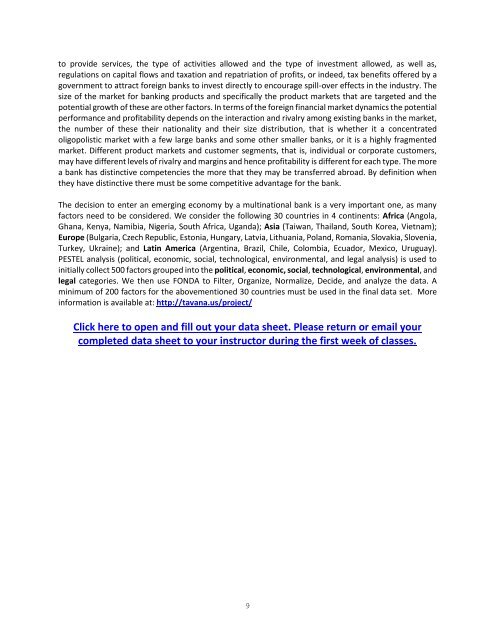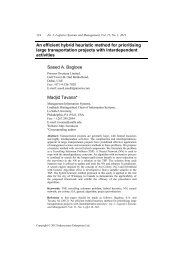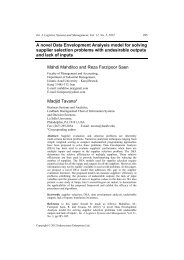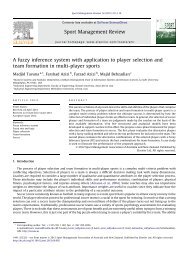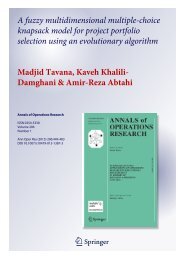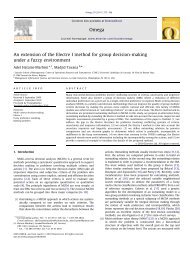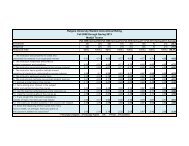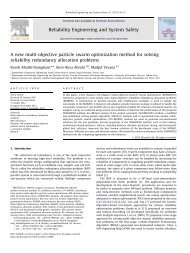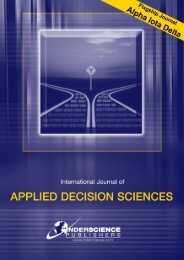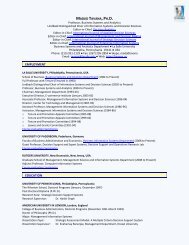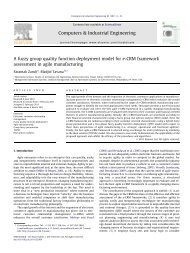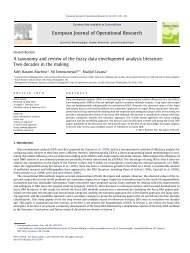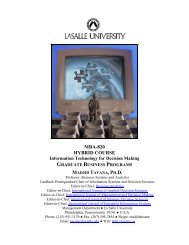Basel MBA-820 Course Syllabus - Dr. Madjid Tavana, Professor of ...
Basel MBA-820 Course Syllabus - Dr. Madjid Tavana, Professor of ...
Basel MBA-820 Course Syllabus - Dr. Madjid Tavana, Professor of ...
- No tags were found...
You also want an ePaper? Increase the reach of your titles
YUMPU automatically turns print PDFs into web optimized ePapers that Google loves.
to provide services, the type <strong>of</strong> activities allowed and the type <strong>of</strong> investment allowed, as well as,regulations on capital flows and taxation and repatriation <strong>of</strong> pr<strong>of</strong>its, or indeed, tax benefits <strong>of</strong>fered by agovernment to attract foreign banks to invest directly to encourage spill-over effects in the industry. Thesize <strong>of</strong> the market for banking products and specifically the product markets that are targeted and thepotential growth <strong>of</strong> these are other factors. In terms <strong>of</strong> the foreign financial market dynamics the potentialperformance and pr<strong>of</strong>itability depends on the interaction and rivalry among existing banks in the market,the number <strong>of</strong> these their nationality and their size distribution, that is whether it a concentratedoligopolistic market with a few large banks and some other smaller banks, or it is a highly fragmentedmarket. Different product markets and customer segments, that is, individual or corporate customers,may have different levels <strong>of</strong> rivalry and margins and hence pr<strong>of</strong>itability is different for each type. The morea bank has distinctive competencies the more that they may be transferred abroad. By definition whenthey have distinctive there must be some competitive advantage for the bank.The decision to enter an emerging economy by a multinational bank is a very important one, as manyfactors need to be considered. We consider the following 30 countries in 4 continents: Africa (Angola,Ghana, Kenya, Namibia, Nigeria, South Africa, Uganda); Asia (Taiwan, Thailand, South Korea, Vietnam);Europe (Bulgaria, Czech Republic, Estonia, Hungary, Latvia, Lithuania, Poland, Romania, Slovakia, Slovenia,Turkey, Ukraine); and Latin America (Argentina, Brazil, Chile, Colombia, Ecuador, Mexico, Uruguay).PESTEL analysis (political, economic, social, technological, environmental, and legal analysis) is used toinitially collect 500 factors grouped into the political, economic, social, technological, environmental, andlegal categories. We then use FONDA to Filter, Organize, Normalize, Decide, and analyze the data. Aminimum <strong>of</strong> 200 factors for the abovementioned 30 countries must be used in the final data set. Moreinformation is available at: http://tavana.us/project/Click here to open and fill out your data sheet. Please return or email yourcompleted data sheet to your instructor during the first week <strong>of</strong> classes.9


